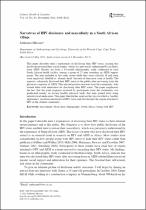| dc.contributor.author | fecane, Sakhumzi | |
| dc.date.accessioned | 2023-07-11T12:45:42Z | |
| dc.date.available | 2023-07-11T12:45:42Z | |
| dc.date.issued | 2012 | |
| dc.identifier.citation | Mfecane, S. (2011). Narratives of HIV disclosure and masculinity in a South African village. Culture, Health & Sexuality. doi:10.1080/13691058.2011.647081 | en_US |
| dc.identifier.uri | https://doi.org/10.1080/13691058.2011.647081 | |
| dc.identifier.uri | http://hdl.handle.net/10566/9195 | |
| dc.description.abstract | This paper describes men’s experiences of disclosing their HIV status, arguing thatdisclosure restored their social respect, which was previously undermined by an illnessfrom AIDS. Results are from a 14-month ethnographic study conducted in ruralSouth African health facility, among a group of 25 men attending an AIDS supportgroup. The men included in this study tested while they were critically ill and somewere negatively labelled as ‘already dead’ because of their poor state of health. Themajority voluntarily disclosed their HIV status to the public after recovering from thephysical symptoms of AIDS. This elicited positive reaction from the community, whotreated them with admiration for disclosing their HIV status. The paper emphasisesthe fact that the good response received by participants from the community waspredicated mainly on having healthy physical looks that men gained from usingantiretroviral medication. This paper then further analyses the ways in which a ‘healthyappearance’ facilitates disclosure of HIV status and also disrupts the stigma attached toHIV in the studied community. | en_US |
| dc.language.iso | en | en_US |
| dc.publisher | Routledge | en_US |
| dc.subject | Living with HIV | en_US |
| dc.subject | South Africa | en_US |
| dc.subject | Ethnography | en_US |
| dc.subject | Black men | en_US |
| dc.subject | Masculinity | en_US |
| dc.title | Narratives of HIV disclosure and masculinity in a South African village | en_US |
| dc.type | Article | en_US |

